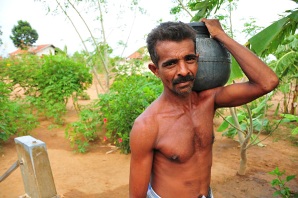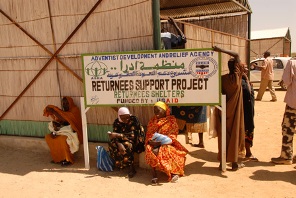As the first phase of resettlement of internally displaced persons (IDPs) continues in Sri Lanka, a lack of basic emergency resources, such as water, food, and proper sanitation, are compromising the health and well-being of those currently residing in temporary camps in the northern region of the country, reports the Adventist Development and Relief Agency (ADRA).
“These people are arriving after months on the run, and have sustained losses to their homes, belongings, and families,” said Edgar Castillo, country director for ADRA Sri Lanka, adding that many of the survivors are also suffering from injuries, malnutrition, and psychological scarring.
To properly identify current needs within the IDP camps, ADRA completed a visit to Vavuniya from June 15 to June 18, meeting with government and local authorities, and other non-governmental organizations to better identify and address those needs.
In response, ADRA is opening an office in the northern town of Vavuniya and has signed a Memorandum of Understanding with the Ministry of Resettlement and Disaster Relief Services to ensure appropriate access to camps in the area where nearly 262,000 IDPs are currently residing, according to the United Nations Office for the Coordination of Humanitarian Affairs (OCHA).
At the request of Sri Lanka’s National Water Supply and Drainage Board, ADRA is preparing emergency water trucking for two new IDP villages, Veerapuram and Sumathipuram, which opened June 5, and host more than 10,000 IDPs. ADRA is the only humanitarian agency in Sri Lanka that owns and operates a drilling rig for borehole drilling, and has extensive experience in several water and sanitation activities, including water tank installation, hand pumps, hand dug wells, water disinfection units and water trucking.
Through ADRA’s intervention, each beneficiary will receive an estimated four gallons (15 liters) of water a day for, for drinking and bathing, targeting approximately 4,000 people.
“Emergency shelters and water and sanitation facilities are being installed as quickly as possible, but much more is needed to protect those who have been made vulnerable in this crisis,” added Castillo. “With the war finally over, we want to do everything that we can to help, as the country starts down the long road of reconciliation, resettlement and rehabilitation.”
The entire project is valued at nearly US$15,000, and is funded in partnership by ADRA International, the ADRA Asia Regional Office located in Bangkok, Thailand, and ADRA Sri Lanka.
More than 70,000 people were killed during the 25-year Sri Lankan civil war that ended in May. Hundreds of thousands of civilians were forced to flee their homes due to the violence, many of which still reside in IDP camps located in the north.
ADRA is a non-governmental organization present in 125 countries providing sustainable community development and disaster relief without regard to political or religious association, age, gender, race or ethnicity.


